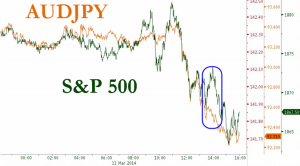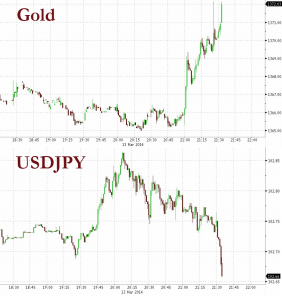Imagine if the outcome of a football game depended more on the weather than on the talent of the players.
Weather, indeed, can have an impact and should, but its role is usually to test the talents of the players, not to be the primary factor in the outcome. When it is the primary factor, anything can happen. In such cases, would you put money on the game?
The weather is not the number one factor affecting the performance of the stock market these days, but neither is the talent of the players – that is, the fundamental performance of publicly held companies.
In recent years, The Federal Reserve Board has held sway over the market’s performance via quantitative easing, although under former Chair Ben Bernanke, it was somewhat more predictable than the weather.
Now, with tapering under way, that may change (we’ll see, as many expect plenty of bond buying ahead). Yet other world events may replace QE in determining the performance of the market. That means potentially greater volatility than we’ve experienced in the easy money era.
It doesn’t take much to affect today’s global economy, especially when the impact of events is amplified by high-frequency trading. Consider, for example, the impact of the falling yen and Australian dollar on the S&P 500.
It all began with rumors of another corporate default in China, which caused copper prices to fall. Shanghai Chaori Solar Energy Science & Technology Co., which makes solar cells, became the first Chinese company to default on onshore notes when it failed to make a full coupon payment on March 7. The default, although not unexpected, created speculation that other companies would default.
As copper prices tumbled, the Australian dollar plummeted at the same time on rumors of a levered fund unwinding, with a tie-in to a commodity play involving China.
The result, as the chart from Zerohedge shows, was that the S&P 500 mirrored the Australian dollar and yen throughout the day, except for a brief time early in the afternoon.
If that’s not enough correlation for you, consider how the dollar mimicked the yen this week, while gold has been rallying.
What About Ukraine?
If the rumor of a corporate default in China can have such a significant impact on U.S. markets, what will happen if the Chinese economy continues to decline? What impact will other world events have?
China’s exports fell more than 18% in February, creating a trade deficit of $22.98 billion. Economists had predicted a 7.5% increase in exports and a surplus of $14.5 billion. If March figures show a trend, it could have a butterfly effect on world markets.
Then, of course, there’s Ukraine. The world will be watching Sunday’s vote on Crimea’s annexation by Russia, but it’s likely that “watching” is all that will take place.
President Obama said the “international community” will stand “firmly behind” the Ukranian government. After all, standing behind is now the official U.S. response to international crises.
There was little response from the “international community” when Russian President Vladimir Putin invaded Georgia in 2008 and there has been little response to his heavy-handed treatment of Ukraine, along whose border Putin has stationed more than 80,000 soldiers, 270 tanks, 370 artillery systems and 140 combat aircraft.
To date, western action has been practically nonexistent. No sanctions, no strategy, no military action and no economic action. But finally, with tension building, NATO has announced its own deployment of fighter jets and exercises in countries on Ukraine’s western border.
There is little doubt about the outcome of Sunday’s referendum vote. But if Crimea is annexed and no action is taken by the west, what will President Putin take next? The rest of the Ukraine? Latvia? Poland?
Might things be different today if President Obama, in one of his first foreign policy actions, had not canceled the deployment of missile defense interceptors in Poland and the Czech Republic, which were negotiated by President Bush over Russian opposition?
Might things be different today if President Obama had taken a firmer stand against the defection of Edward Snowden, who took America’s stolen secrets with him to Russia?
Might things be different today if President Obama hadn’t avoided taking action in Syria when President Bashar Assad used chemical weapons on his own people?
Recall that President Obama counted on President Putin to negotiate a face-saving chemical weapons agreement in Syria. President Assad has violated the agreement and, to no one’s surprise, there have been no repercussions. Now President Putin has invaded Ukraine and, if there are no repercussions, no one will be surprised.
Market reaction is unlikely to be as passive as political action has been to date. It’s time to reset the reset.
